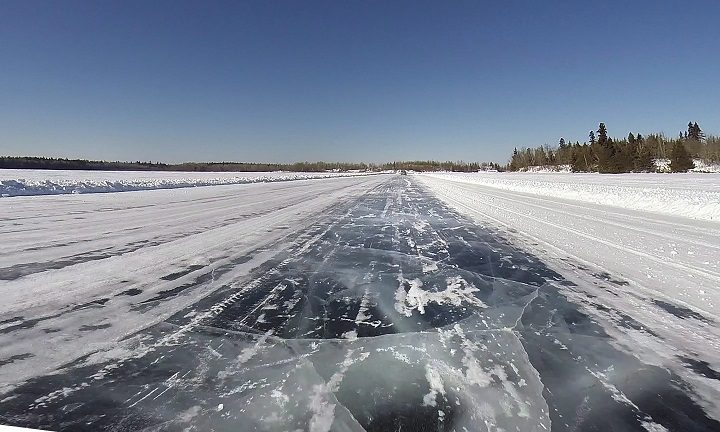The winter season for the ice road on Temagami First Nation was the shortest anyone can remember.
The road, which is about seven kilometers long and made of packed snow and ice, was only open for 11 days, connecting the island First Nation to the mainland.
This resulted in delayed projects, limited access to groceries and health care, and a more unpredictable season for the community's approximately 250 residents, as they adapt to a future influenced by global warming.
David McKenzie, the executive director of the First Nation, stated in an interview this week that everyone he spoke to cannot recall a shorter season. He is fairly certain it's the shortest ever.
The warmest winter on record in Canada has caused widespread issues for First Nations in northern Ontario that rely on a network of winter roads built over frozen land, rivers, and lakes.
In February, the Nishnawbe Aski Nation, representing 49 First Nations in Ontario, declared a state of emergency due to the ice road conditions.
These roads are crucial for 32 remote First Nations, providing a more convenient and affordable means to transport a wide range of items, from basic goods to construction materials for summer use.
Temagami First Nation, the southernmost of these communities, was the first to close its winter road for the season on March 1, as per updates provided by NAN and the First Nation.
The uncertainty surrounding the accessibility to and from the island can lead to anxiety among the people, according to McKenzie.
McKenzie mentioned that due to concerns about the ice, there were fewer people engaging in traditional winter activities, such as ice fishing, in the local community on Lake Temagami.
Chief Russell Wesley of the Cat Lake First Nation stated that his community received funds from the federal government to purchase a snow machine to assist in creating the winter road.
Chief Wesley noted during a news conference at Queen's Park this month that travelling on their winter roads is hazardous, particularly due to water crossings becoming more dangerous and unpredictable as a result of climate change.
Canada is warming at a faster rate than the rest of the world, partly due to diminishing snow and ice coverage. Although experts attribute this winter's record warmth to El Niño, a natural climate pattern marked by weakened trade winds and changing Pacific Ocean waters, many point to human-caused climate change as the primary cause.
In the summer, the community of Temagami is accessible by barge. Conversely, some fly-in First Nations to the north rely solely on trucks on the winter roads to transport large equipment and materials that cannot fit on small planes.
According to McKenzie, they have not encountered major delays in infrastructure projects, unlike some more northern First Nations.
However, there are still obstacles. The community had plans to transport a "mini home" on the winter road to be used as transitional housing for individuals in crisis, as per McKenzie.
“We had to reassess our plans, and we’re going to be using a barge this summer instead. But that means the community won't have this necessary resource for maybe another three or four months,” he said.
While the ice is not thick enough for larger vehicles, the First Nation was still running a snowmobile shuttle to the mainland as of this week. But depending on those machines to get on and off the island also has its difficulties, McKenzie said.
“We’ve been dealing with things like having to transport the food bank supplies across on snow machines, taking elders to medical appointments all winter long on snow machines,” he said.
“And trust me, when an elder has to go in for a medical appointment … to ask them to get on a sleigh behind a snow machine as part of that is a big request.”
The ice will also eventually become too thin and make the snowmobile shuttle too risky to operate. When that happens, there will be a period in-between – what McKenzie referred to as the “break up” or the “in-between” season – where residents are basically stuck on the island until the ice breaks up and boats can pass safely again, McKenzie said.
That season seems to be getting longer, McKenzie said. What used to usually be a four- or five-day stretch has turned into two weeks in some years, he said.
The community, he said, has a helicopter company on retainer next week in case of emergency during that season, but residents are otherwise being encouraged to stock up on groceries and get prescriptions filled in anticipation of the break up.
“We have to be ready for this uncertainty,” he said. “But trust me, when you’re dealing with elders and young people who do have things that they have to get off the island for, this uncertainty does not make their lives any easier.”
McKenzie said the community may eventually seek funding for an additional airboat – a watercraft propelled by an aircraft-type propeller – or an icebreaker.
“I think we just have to modify our infrastructure plans to cope with this in the long term as well, and not just hope that the climate change can be fixed,” he said.
“Locally here, we just have the issue of how do we get off and on the island.”



